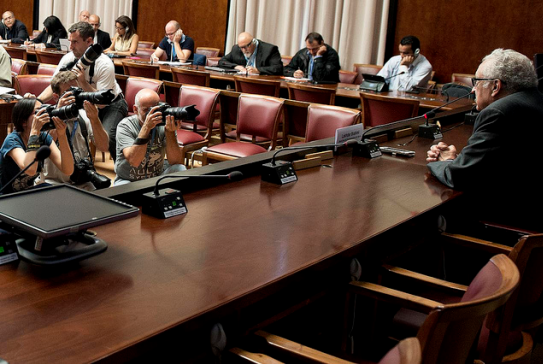By Nadine Moedt (The Cascade) – Email
Print Edition: September 4, 2013
An estimated 1,429 civilians are dead in Syria, among them 427 children. Horrifying YouTube videos show lines of unscathed bodies, all killed in an alleged chemical attack.
First reactions leaned towards moral outrage. Secretary of State John Kerry has declared that the United States has a obligation to intervene; it is an “obscenity,” and a “crime against conscience.” UK Prime Minister David Cameron calls the events “morally indefensible.”
Obama spoke of chemical weapons use being a “red line” in Syria last August. With this comment he put himself in a difficult position; the line has now been crossed in an “inexcusable” way (previous knowledge of smaller scale chemical attacks has been noted, but mostly ignored), and now the Obama administration must act to save its own verbal credibility.
In Secretary of State John Kerry’s recent speech, he declares the intention to intervene without waiting for the UN investigation into the deaths to come to a close. The report “will not confirm who used these chemical weapons,” he states, but “will only affirm whether such weapons were used.”
Acting through the UN is a futile path; China and Russia, both of whom have veto power in the Security Council, will not allow action against Syria. Both have interests in the region.
The action would not be akin to another Afghanistan or Iraq, Kerry says.
“It will not involve any boots on the ground. It will not be open-ended. And it will not assume responsibility for a civil war that is already well under way.”
The question is simple. Why now? What is the purpose of an intervention at this point in Syria’s conflict? It seems fairly obvious that it is not about the lives of Syrian innocents; with refugees fleeing by the thousands and a death count of over 100,000, the moment for that has long since passed.
A simple explanation would be that to punish Syria for using chemical warfare would be a deterrent to others. Regulate war, we reason. But as Al Jazeera’s Rachel Shabi points out, this is not a consistent thought. There was no red line present in 2008, when Israel deployed white phosphorus in Gaza, and there was no red line when the US used depleted-uranium ammunition in Fallujah, Iraq. Where was the moral outrage then?
The latest talk of military punishment would involve a “surgical” airstrike, according to Al Jazeera. Several objections from this relatively ignorant outsider spring to mind. A “surgical” airstrike is a ludicrous term, for one. There is nothing surgical about an airstrike. Who would the US target? What if innocent civilians are caught in the crossfire? If the chemical weapons themselves are the target, wouldn’t a strike simply release the chemicals on whoever resides near it? It feels very one-foot-in, one-foot-out of the US; they want to take self-righteous action amidst a brutal civil war, but only without putting themselves in the line of fire. Throw them a bone, throw them a missile.
Secondly, as Shabi notes, the matter of the aftermath has remained entirely unaddressed. Due to the “current, accelerated impetus to strike,” Shabi writes, “there is little thought given to consequences, no planning for the day after – no political plan at all.” Shabi argues that this proves the Western world is focused on “saving face” rather than “saving lives.”
We need to prove that the West is the civilized party here; as Syria strains under the weight of its own civil war, the US fluffs its moral feathers in an “overwhelming need to prove that the West is the good side.”
The US needs to stop and think about the responsibility we have in Syria. Using a puffed up sense of morality to justify an attack on another country has not worked in the past. The high-minded mission in Iraq has left tens of thousands dead since 2003.
Halla Diyab, spokesperson for the Organisation for Freedom and Democracy in Syria, questions the motives of the US, and criticizes their reactionary decision to get involved:
“What is the objective of the intervention of the West? Is it to get rid of Bashar al-Assad? Or is it to help Syrians to achieve democracy and freedom? Or is just because Bashar al-Assad has used chemical weapons? There should be [an] investigation and tangible evidence that the regime has used chemical weapons; [they should] not base their claims on YouTube videos that have not been verified.”
So how to proceed? It’s a squirrely sort of situation. On one hand, no one can be expected to stand by and watch as children and civilians are slaughtered. On the other hand, we’ve been doing that since day one of this civil war.
U.N. Secretary-General Ban Ki-moon has declared that any punitive strike against Syria would be considered illegal in the eyes of the U.N. without the approval of the Security Council. Ban warned in a news conference that a strike could simply create more “turmoil and bloodshed” in Syria, according to The Province.
It is ironically immoral for the US to go ahead and use their moral posturing to perform an airstrike on Syria. A moral international response does not involve antagonising the UN. As Shabi questions, how could a humanitarian response be coordinated for refugees without the support of neighboring countries? It is nothing short of “diplomatically rude.”
We have to remember that our western inflated sense of self—our democratic ideals and regulations on war—cannot be forced on anyone. As a first step to any sort of intervention, we must seriously rethink our responsibility in the Middle East.



